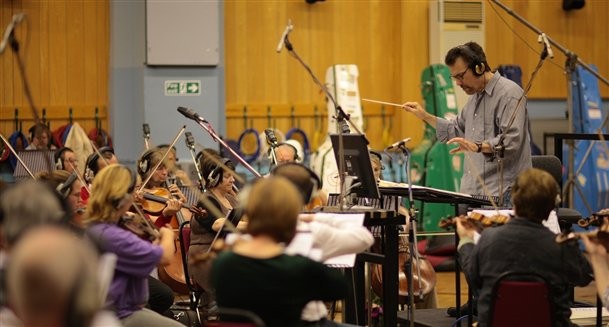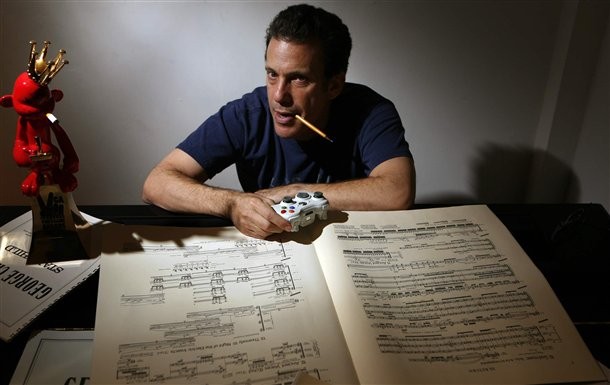Subscribe today to receive the next issue of Game Informer, featuring the Most Anticipated Games of 2026!
Behind The Score: BioShock 2
The unforgettable string-heavy score of the original BioShock was dark, eerie and violent, and at times emoted despair, sadness and fear. Any of these adjectives could easily be used to characterize the underwater dystopia itself. The hauntingly beautiful score composed by Garry Schyman won Best Original Score from the Academy of Interactive Arts & Sciences, a VGA for Best Score and many other awards, putting Schyman on the map as one of the industry’s leading composers. Schyman has just completed work on the score for BioShock 2 and shares with us the process of creating a captivating soundtrack for Rapture, and how his past work and musical influences have played a role.
Schyman began his career composing for films and television, and while he scored a few Voyeur games for Philips Interactive in the mid-90s, his focus remained on other mediums. It wasn’t until 2004 that Schyman’s agent passed his demo tape along to THQ that he made his way back into games. The company thought he would be perfect to work on their next project, Destroy All Humans!. THQ was looking for sound a similar to the work of Bernard Herrmann, a composer known for film scores in the sci-fi and horror/suspense genres. They knew after hearing his demo that Schyman would deliver. After several award nominations for his score in Destroy All Humans!, he decided to focus on composing for the video game industry. Following his work on this title, he began work on BioShock, another game that was a perfect fit.
“The interesting thing about it is the type of music we settled on as the style of the game is the type of music I naturally would write if someone were to just say: 'Write whatever you want to write,’” says Schyman on BioShock. “I love that period of music, the early 20th, mid-20th century…so it was very natural to me. It was like if someone asked the Beatles to write a Beatles song. They were asking me to do something I was made for.”
Still, finding the perfect sound for the world of BioShock wasn’t easy. Schyman says as part of composing the score, there were many creative meetings to discuss the style and needs for different parts of the game (he was only involved with the original score, not the licensed music). He recalls mock ups that were created with samples and synthesizers that were not approved by creative director Ken Levine and audio director Emily Ridgeway, or were simply used in parts of the game for which they weren’t originally intended. Schyman recalls a few of these approaches he took for the perfect sound that weren’t quite right.
“The polka approach was really wrong,” Schyman jokes. “We still knew we wanted early 20th century, we just weren’t coming up with the right uniqueness. At the time I had never seen a game like BioShock. It felt groundbreaking to me and Emily felt the same way. This was really an opportunity to do something really unusual. It was really hard to find, it’s easy to describe now looking backwards at the process, but at the time I went through about three or four different themes for the game, and the audio director kept saying: ‘No, that’s not right.’ She was more polite than that, actually, more like: ‘Yeah maybe, but let’s try something different.’”
So he did.
Schyman used the work of early- to mid-20th century composers including Stravinsky and Shostakovich to help guide him in the right direction (if you click on the links to the audio you can hear the similarities to the final score). What became unique about the score, however, was the combination of different musical styles that are not typically used together. There is the aleatoric style, which Schyman describes as a “controlled chaos” or improvisation among members of the orchestra, in this case using dissonant and eerie effects to crank up the creepiness. Also present in the score is musique concrete, which infuses real sounds of the world including everything from non-singing human voices to the sound of bells in the fisheries to add atmosphere. Added to the mix were the iconic, soulful, solo violin and cello segments that range from tranquil to terrifying. With these musical elements, Schyman finally came across the right approach.
“When I really did come upon the approach, I knew it immediately and I said to her [Ridgeway]: ‘You’re going to dig this.’ It had these really eerie backgrounds with this solo violin against it. It just seemed really unusual and really right for the game,” says Schyman.
Schyman's unusual sound for the world of Rapture met critical and commercial success, winning many awards and honors.
"You know I wasn’t sure. I felt like I had done something really different and that there was a chance it would get recognized for that. Emily had said: 'You’re going to win some awards for this.' And I was like: 'Well, that would be cool," says Schyman. "I certainly didn’t expect the response. It was wonderful and deeply appreciated. I thought it was possible that some really good things would accrue from it, but I was a little overwhelmed by how positive the response was. It was great."
Schyman’s experience composing the score for the original BioShock and finding the key approach made working on his next project, BioShock 2, much easier.
“It was easier from the standpoint that we knew we didn’t want to take a left turn to something completely different, and I think in some ways the music is more refined in a way,” says Schyman. “I knew the style and I had been thinking about it for a while now, and I think I was just better at. I don’t want to say it’s a better score, I think it’s just as good, but in some respects I’m more pleased with it."
Schyman already had the sound’s groundwork laid out from the original game’s score to help compose for BioShock 2. The difference of 10 years in the narrative between the first and second game didn’t influence the score of the sequel nearly as much as intensified combat and new environments has.
“When I originally scored BioShock 1 there was no combat music, and it was only at the end that they brought me back to compose four combat cues because they initially thought the combat would play fine without music,” says Schyman. “With BioShock 2, there was a realization that the intense combat music would help those moments.”
Schyman worked on original tracks for BioShock 2’s different levels as well.
“There’s some really interesting places in BioShock 2 that are new and unique, and scoring those just was its own unique need,” says Schyman. “For instance there’s this area in the game, originally it was called ‘Ghetto’, I don’t know what they ended up calling it, but it was sort of this poor section where I added some bluesy elements. I brought in a wonderful woodwind player, Steve Tavaglione, who does a lot of work with Tom Newman. He did some really cool things with these twisted bluesy performances. It’s a fresh game so it had different needs and whenever those needs appeared I helped them with music.”
Both BioShock games have been recorded at Capital Studios & Mastering in Hollywood, a studio that has been around for 50 years, and a location where many film and video game scores have been captured. Now that recording has ended and BioShock 2 is preparing to ship in a couple weeks with the special edition throwing in the game’s score on CD, will BioShock 2’s score meet the same acclaim as the first?
“I think if people like the score of BioShock 1, they’ll like the score of BioShock 2 for sure,” says Schyman. “I didn’t just retread the first one. I think it’s different and yet familiar stylistically. I don’t think people will be disappointed if they liked the first score. I certainly hope it’s just as well received, but you never know.”
For more on composer Garry Schyman, visit his official Web site, garryschyman.com.










